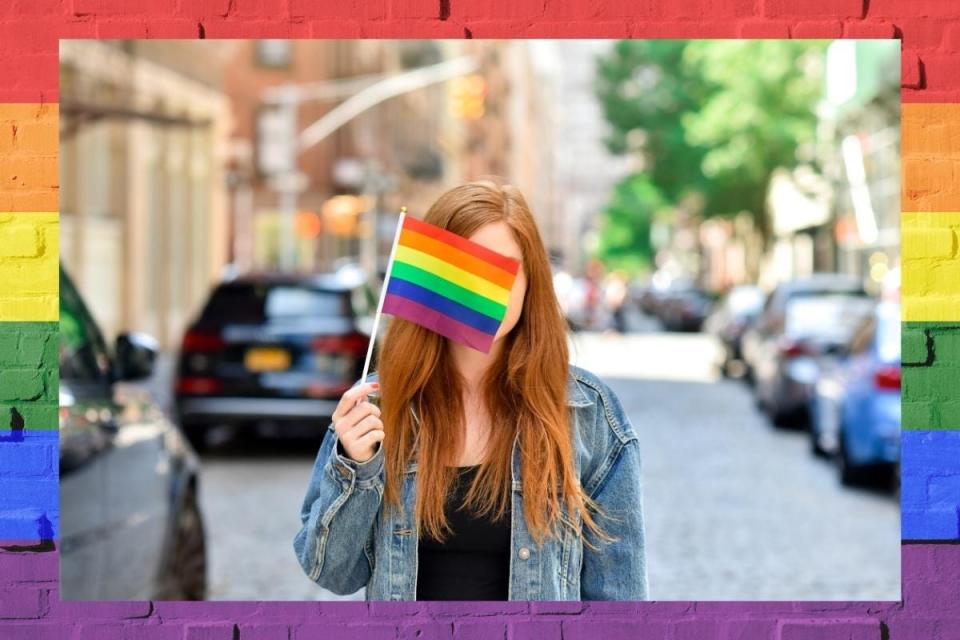Hiding behind rainbow flags: These companies' political donations don't match their support of LGBTQ issues
In a year when a record number of anti-LGBTQ bills have been introduced in statehouses and Congress remains stalled on the federal Equality Act, the eyes of the public, employees and the LGBTQ community will focus more acutely than ever on how corporations celebrate Pride Month in 2022.
Gone are the days of rainbow-washing corporate social media accounts in June and selling a few rainbow retail items without backing up those displays with real action, advocates said.
"It is so amazing to see more and more brands celebrating Pride Month every year, but it must be done with authenticity," said Sarah Kate Ellis, president and CEO of GLAAD. "What we've seen over the past few years, especially as pride participation has grown, our community holding brands accountable has grown as well."

WILL IT WORK?: Anti-trans bills could be one key Republicans use to rally their base ahead of midterms
'IT'S A VERY LONELY WORLD': For LGBT conservatives, anti-gay legislation prompts frustration, doubts
But while companies are feeling increased pressure to publicly demonstrate their commitment to diversity and inclusion, they also fear becoming the next Disney – being retaliated against by politicians if they speak out too much against specific anti-LGBTQ legislation.
Many end up sending mixed messages – declaring their commitment to their LGBTQ employees and customers, especially during June, but donating money to politicians who actively oppose gay rights, trans medical care and more.
USA TODAY looked at the eight Fortune 10 companies that earned the Human Rights Campaign Foundation's "Best Places to Work" designation this year and found that seven of them donated to politicians in 2020 who have voted against LGBTQ interests, opposed marriage equality, sponsored anti-trans bills or opposed the federal anti-discrimination bill, the Equality Act.
Jessica Shortall the founder of Texas Competes, a business coalition standing up for LGBTQ equality in that state, and the director of America Competes, a national coalition within Freedom For All Americans, said businesses are walking a tight rope in this moment between a real recognition of the need to advocate for LGBTQ rights, as their employees and customers increasingly demand, and the desire to protect their bottom line from political retaliation.
"I very much understand that hurt and concern … folks that are saying why does this company that is awash in rainbows one month out of the year donate to these politicians?" she said. "And I also know again … it's not just money, but having a friendly, warm relationship with a lawmaker sure helps when it's time to go talk about why a culture war bill will hurt the company and their business and their jobs."
Rising to the political moment
More than 230 anti-LGBTQ bills have been introduced in statehouses so far this year, with about half of them targeting transgender people, according to data from the American Civil Liberties Union.
Companies in some states have signed petitions pledging their opposition to such bills or joined coalitions like Texas Competes to show solidarity.
But other companies take a quieter approach, choosing to work with lawmakers they know or donated to behind the scenes, Shortall said.
"What we hear privately is they care a lot about their employees, who are, you know, rightly terrified in Texas, for example," she added, referencing a new directive that health officials report parents who seek gender-affirming medical care for their transgender children or teens.

Companies "care about workplaces and communities, not just the four walls of the workplace, but the community where people live and go home at the end of the day where everybody feels safe. They care about those things and they're really important to their long-term bottom line," she said.
But equally important to their bottom line is the threat of being hit with political retaliation because the legislature or governor doesn’t like what they’re saying, Shortall explained.
Businesses have said they don’t want to be the next Disney, meaning they want to avoid both the backlash Disney got for not speaking out against the Florida legislation critics called the "Don’t Say Gay" bill, with employees organizing walkouts and trending hashtags against the company, and the political pressure the company is now under after finally speaking out.
Story continues below.
Florida Gov. Ron DeSantis signed a bill in April that would terminate Disney’s special tax district.
Shortall said many companies feel a behind-the-scenes approach to killing anti-LGBTQ legislation is more effective.
"A lot of them are doing it quietly because in the current environment, that is what is more successful and still to this day the vast majority of anti-LGBT bills die in state legislatures and most of them die quietly," she said, although Disney’s initial quiet approach to Florida’s bill had no bearing on its outcome.
Because of the real threat of harm happening across the country in this political moment, Ellis of GLAAD said it’s more important than ever this Pride Month and year-round for companies to put their clout behind their rainbow flags and not stay silent.
She said if Disney, with its enormous economic clout in Florida as the largest private employer, can’t get things done behind the scenes, "then I have a big question mark who can get what done behind the scenes."
"We have a really, really aggressive political environment where we are being weaponized and politicized and we need corporations standing up to humanize us, because if they let us be politicized, then that is validating that we are just political pawns instead of being people and humans," Ellis said.
LGBTQ consumers say companies send a clear message when their actions don't match their Pride message.
"It's that the CEOs and the founders that are on top boards are homophobic and transphobic," said Isaias Hernandez, who goes by Queer Brown Vegan on social media. "I think it continues to showcase how brands are able to mimic and also to bend the rules within who they're supporting."
Story continues below.
Campaign contributions belie companies' good work on LGBTQ issues
The Human Rights Campaign Foundation’s annual Corporate Equality Index (CEI) gives the nation’s largest corporations a score out of 100 for their commitment to LGBTQ equality in the workplace.
Of the top 10 Fortune-ranked companies, eight earned 100% ratings this year. The index ranked 1,271 companies in total this year.
That means they met the criteria of having both sexual orientation and gender identity nondiscrimination policies, offering domestic partner benefits and transgender-inclusive health benefits, demonstrating organizational LGBTQ competency and making a public commitment to the LGBTQ community.
A few ways a corporation can demonstrate their public commitment is by taking part in Pride events or donating to advocacy groups.
The index does not measure whether a company takes a stance against harmful legislation or donates money to politicians on either side of the aisle.
In fact, seven of the eight top Fortune-ranked companies that earned 100% ratings donated money to federal candidates in the 2020 election cycle who are considered anti-LGBTQ by GLAAD’s Accountability Project.
► Walmart, while donating $10,000 each to the campaigns of numerous strong LGBTQ advocates in Congress, also donated the same amount to the campaigns of former Sen. Kelly Loeffler, R-Ga.; Senate Minority Leader Mitch McConnell, R-Ky.; Sens. Steve Daines, R-Mont.; and Joni Ernst, R-Iowa, according to campaign finance data collected by nonprofit watchdog group OpenSecrets.
Loeffler introduced the Protection of Women and Girls in Sports Act last year which aimed to ban transgender athletes from women’s sports.
McConnell has a long record of voting against LGBTQ rights and protections. In 2020, as majority leader, he refused to bring the Equality Act to the Senate floor for a vote.
Daines was a vocal opponent of the Obergefell decision that recognized same-sex marriage nationwide. He also co-sponsored a bill that would allow nonprofit organizations to engage in political activity, as long as they were championing heterosexual marriage, while nonprofits supporting marriage equality could not engage in the same political activity.
Ernst voted against amendments to protect LGBTQ students from discrimination in public schools; to provide benefits to same-sex spouses of veterans and their children in states where their marriages weren’t recognized; and to ensure same-sex spouses had equal access to Social Security and veterans benefits.
► Amazon, another company with a 100% rating on the CEI, also donated to Ernst’s and Daines' campaigns. The company donated $10,000 to former Sen. Martha McSally, R-Ariz., and $6,000 to Sen. Lindsey Graham, R-S.C.
McSally was described by HRC in 2017 as someone who "will vote in favor of workplace protections for LGBTQ people, but then will vote for broad religious exemptions that undercut those same protections."
Graham was one of the original co-sponsors of the Defense of Marriage Act and has been a vocal proponent of "traditional marriage."
Amazon also gave $5,000 in 2020 to the campaign of Sen. Mike Lee, R-Utah, who co-sponsored Loeffler’s anti-trans sports legislation.
Because corporations are barred from contributing directly to federal campaigns, those numbers come from donations made by affiliates and political action committees associated with the companies. Those totals do not include donations made by individuals – for example, if an executive of a company donated to a candidate.
Walmart told USA TODAY "Our political contributions support officials on both sides of the aisle and are focused on retail matters that help our customers and members save time and money. We will continue to support our LGBTQ+ associates and community, and we know that when Walmart is a place of opportunity for all, it’s a place that is inclusive, diverse and equitable."
Amazon did not respond to a request for comment.
Shortall said businesses often donate to candidates who will have control over aspects of their industry, out of a desire to work together for job creation.
"There are corporate incentives and there are tax structures and there are all kinds of things that go on that could be at the whim of a governor or state legislature," she said. Political decisions can have a big impact on a company’s bottom line, which in turn impacts its ability to hire in that state.
"I was talking to a company today that operates in a state with a smaller economy and they stated they want to keep jobs in the state … we love our LGBTQ employees in this state and we want to keep employing them here," Shortall said.
The other Fortune top 10 companies that have 100% ratings on the CEI donated to the following federal candidates in 2020, all of whom are highlighted on GLAAD’s Accountability Project for anti-LGBTQ voting records or statements.
► CVS Health donated $5,000 to former Sen. David Perdue, R-Ga.
► UnitedHealth Group donated to Perdue, McSally and Ernst.
► McKesson Corp. donated to McSally and Ernst.
► AT&T donated to McSally and Loeffler.
► AmerisourceBergen Corp. donated to Perdue, McSally and Sen. Tim Scott, R-S.C., who voted against the Employment Non-Discrimination Act, an early version of the Equality Act.
UnitedHealth Group also donated $275,000 in the last gubernatorial campaign to Florida's DeSantis, according to records from OpenSecrets’ followthemoney.org.
AT&T PACs donated to both DeSantis and Texas Gov. Greg Abbott who issued a directive in February to state health agencies saying gender-affirming medical treatments for transgender youth constitute child abuse and parents who seek such treatment for their children should be investigated.
AT&T said in a statement:
We are proud of our company’s support of the LGBTQ community and the recognition we have earned for providing a welcoming, respectful workplace for all our employees. … Contributions to a particular lawmaker do not mean we support their views or actions on every issue. We are mindful of diverse and complex societal issues that affect us, and we most immediately address these issues through direct social programs, philanthropy, employee benefits, and community involvement.
A spokesperson for AT&T pointed to the company’s anti-discrimination policy that dates back to 1975 and said they have one of the oldest LGBTQ Employee Resource Groups in the nation. The company began offering domestic partner benefits in 1998 and trans-inclusive health care benefits in 2006, before many other corporations.
CVS Health, UnitedHealth Group, McKesson, and AmerisourceBergen all did not respond to USA TODAY's requests for comment on their political donations.
All these companies also donated to Democratic candidates as well, many of whom are vocal advocates for the LGBTQ community.
Keisha Williams, director of the workplace equality program that manages the Corporate Equality Index for HRC, said companies in highly regulated industries tend to donate across the board because of lawmakers’ ability to impact their businesses. She said HRC encourages businesses to do this in a smart way that can benefit their LGBTQ advocacy down the road.
"Look at your giving policy and if you don't have a giving policy, make sure that you develop one because what we're finding is businesses are donating to the candidates across the board," Williams said. "A year later, or two, a candidate has some kind of legislation that is adverse to the LGBTQ plus community."
She said HRC suggests that organizations make sure they’re wielding the power that those donations afford them. At the very least, have a conversation with that lawmaker about the impact that bill will have on their employees.
► Apple Inc. is the only Fortune Top 10 company with a 100% rating from HRC to not donate to any political candidates in the last election cycle.
Apple spokesman Fred Sainz said, "Apple doesn’t make political contributions and it does not have a PAC."
Corporate Equality Index is not a shield for bad behavior
Leaders at HRC have repeatedly said their index is only a measure of workplace diversity and inclusion policies and have, in fact, chastised companies for using a 100% rating as a shield when called out for actions or donations that go against the LGBTQ movement.
"One of the things that we know and that we communicate to all the companies that we work with is how damaging and harmful PAC donations to anti-LGBTQ plus politicians is to the community," Williams said. "And we really encourage companies to reckon honestly with how their donations to these politicians squares with the work that they're doing in their workplaces to drive inclusion as well as their broader engagement with the community."
HRC has started making companies who want to tout their "Best Places to Work" status sign a legal document that acknowledges they know they cannot use the CEI as a shield to excuse any of their actions that are adverse to the LGBTQ community, including their political contributions.
Story continues below.
.oembed-frame {width:100%;height:100%;margin:0;border:0;}
The CEI is in its 20th year, and the number of companies participating and earning top rankings has grown rapidly, Williams said.
In the first year, only 319 companies participated by filling out surveys, and only 13 of those companies got a top score.
"Over the course of the last 20 years we have evolved our criteria and raised the bar consistently over time," Williams said. "And despite the increasing criteria, what we found is a huge amount of engagement and folks are really interested in and want to improve their work environments."
In 2022, 1,271 companies participated and 842 of those companies earned the recognition of Best Place to Work with a 100% rating.
"Almost no companies had trans-inclusive health care, and now 91% of CEI-rated companies have trans-inclusive health care where trans employees have the ability to get mental health services to get pharmaceutical benefits, coverage for going to the doctor as well as top and bottom surgery," Williams said.
Story continues below.
Advice for consumers during Pride
For consumers who want to support companies that are committed to LGBTQ issues year-round and in meaningful ways, it’s recommended to do some quick research.
"You have to ensure that they are supporting the community, not just by putting a rainbow on a product, but by contributing back," Ellis said.
A quick internet search can reveal if the company is donating proceeds from Pride Month sales to LGBTQ causes. The HRC’s index shows how inclusive a company’s workplace policies are. Ellis also recommends looking at whether the company has signed any amicus briefs or released public statements about legislation.

Last year Hernandez shared a social media campaign called "Who Made My Pride Merch?" which looks beyond the U.S. company selling rainbow items to their supply chains. Does the company use labor from a country where being gay is illegal or LGBTQ people are persecuted?
"The point of (the campaign) was to kind of talk about the intersections between environment, labor, exploitation and culture, specifically fast fashion brands who actively exploit queer and trans garment workers," Hernandez said. "And to kind of raise awareness of how the solidarity that brands extend ... or showcase you know pro-LGBTQ, is only limited to certain amounts of demographics within the United States."
"It really is in the consumer’s control to find some of this information out," said Lilly Rotter, senior director of demand generation at Skai, an advertising technology platform that works with many of the nation's top brands.
She recommended looking at the company’s social media accounts to see if they engage in LGBTQ activism outside of the month of June, and looking at the leadership and board members.
"(If) you see that there are bad actors either at the C level or the board level that's a good indication that they might not actually be practicing what they preach," Rotter said.
During June, viewers often see an onslaught of LGBTQ-focused programming on their streaming apps as well.
GLAAD maintains a Studio Responsibility Index that annually evaluates how Hollywood studios and streaming companies do or do not support LGBTQ causes and how much representation they include in their movies and shows.
Follow Katie Wedell on Twitter: @KatieWedell and Facebook: facebook.com/ByKatieWedell
This article originally appeared on USA TODAY: These companies' political donations don't match their LGBTQ support

 money
money 